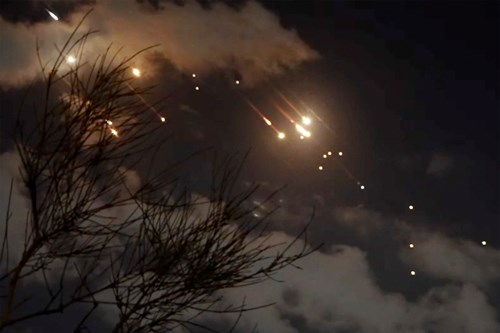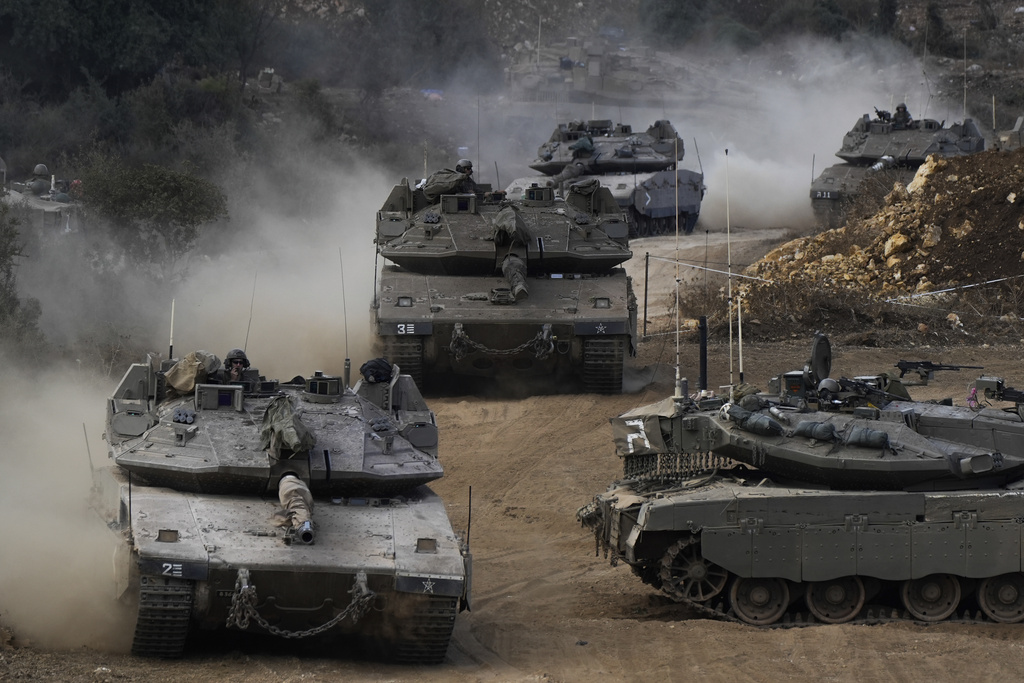Soon the Iranians could be forced to contend with Israel themselves, a fact no doubt lost on Iran when it fired almost 200 missiles into Israel Tuesday.
Most of the missiles were shot down by the Iron Dome defense system with help from U.S. warships in the region, The Daily Mail reported.
U.S. ships Bulkely and Cole fired at least a dozen interceptors as part of Tuesday’s defense efforts, the Pentagon said. The U.S. has a total of seven ships in the region.
 All rockets were fired by Iran. The Yemen-based Houthis were not involved, the Pentagon said.
All rockets were fired by Iran. The Yemen-based Houthis were not involved, the Pentagon said.
Israeli Prime Minister Benjamin Netanyahu has vowed a response, and Iran has vowed a response to Israel’s response.
Israel began its ground began its ground invasion of Lebanon on Monday.
While Iran’s Tuesday missiles were mostly off the mark, a West Bank terrorist attack was not. A shooting and stabbing incident at a Tel Aviv rail station left six dead, including children, and nine others injured. Two gunmen opened fire on passengers. The attack occurred just minutes before Iran’s missile launches.
The attackers carried M-16 military rifles provided by the U.S. to Palestinian Authority security forces, Carolyn Glick, senior contributing editor for the Jewish News Syndicate, said on Washington Watch Tuesday.
“We know that they opened fire in a commuter rail, and apparently many of the dead are children. They got out at a stop, and they continued their murderous spree until they were killed by Israelis that were carrying guns,” Glick told show host Tony Perkins.
Hamas fingerprints on Tel Aviv attack
Iran has been working to get more weapons into Judea and Samaria through Jordan.
“Israel has intercepted a lot of smuggling weapons, but we know that there's a lot that's gotten through. In some of the smuggling routes that we've found and that we've intercepted, we've seen just extraordinary quantities of weapons that are being smuggled by Iran through Jordan into Judea and Samaria.
“So, all of the terrorism right now emanating from all of the various fronts that Israel's dealing with, including Judea and Samaria, are directly linked to Iran through supply and through urging people to carry out more and more attacks,” Glick said.
The Tel Aviv attack occurred through operational coordination between Hamas and Iran, Glick said.

Meanwhile, the U.S. continues to send mixed messages on policy for its key Middle East ally. While it played an important role in defense of Israel Tuesday, there are disturbing reports of the U.S. making background moves to undercut Israeli war efforts, Glick said.
One is the Biden-Harris administration’s confusing sanctioning of West Bank Israeli activists who refer to themselves as “Hilltop Youth.”
U.S. officials announced these sanctions just before Iran’s missile attack against Israel.
The Times of Israel reports it’s unclear whether the sanctions can be effective because “Hilltop Youth,” religious hardliners who have been known to use violence against both Palestinians and Israeli security forces, are not an organized group.
Instead, “Hilltop Youth” is a term used to identify far-right activists who live in the West Bank. The West Bank is Israeli land the Biden-Harris administration has proposed giving away as part of a two-state solution.
 “On a day like this, when Israel is literally fighting actively along seven fronts that Iran and its proxies are attacking it from, the Biden administration thought it was appropriate to issue sanctions against Israeli citizens who oppose the two-state solution,” Glick said.
“On a day like this, when Israel is literally fighting actively along seven fronts that Iran and its proxies are attacking it from, the Biden administration thought it was appropriate to issue sanctions against Israeli citizens who oppose the two-state solution,” Glick said.
Targeting a group with no official standing gives the administration ability to “just label anybody they want as a member of a nonexistent organization and sanction them,” Glick said.
In addition to the Hilltop Youth sanctions, the Biden administration, miffed at not being informed in advance of Israel’s planned airstrike against now-dead Hezbollah leader Hassan Nasrallah, leaked to U.S. media Israel’s planned timing of the ground invasion.
Israelis agree: Keep U.S. in the dark
A Jewish News Syndicate poll showed that 83% of Israelis agreed with Netanyahu’s decision not to inform the U.S. ahead of the Nasrallah mission, Glick said.
Biden-Harris administration officials were overcome with anger at being left in the dark, regional expert Joel Rosenberg said on American Family Radio Wednesday.
“Within hours senior officials were leaking how furious they were, that they weren’t informed, that Israel did this without our permission,” Rosenberg told show host Jenna Ellis.

It’s an absurd response, Rosenberg says, considering that the very Hezbollah leadership and militants killed by Israeli attacks have killed hundreds of Americans in different Middle East incidents through the years.
“How come the United States didn’t bring these terrorists to justice over the last 40 years?" he demanded. "When we do it, we’re criticized. We’re told to stand down and deescalate. We’re getting a clear picture of two entirely different philosophies and approaches to foreign policy and security.”
There have been reports also, Glick said, that the U.S. was coordinating with Iran in advance of Iran’s Tuesday missile launches. The discussion was about the size of Iran’s response, that it would not be too over the top, and would be in measure that would allow the U.S. to step in and pressure Israel about its response that Netanyahu says will follow.
Israel attacks against Iran’s nuclear facilities are “being considered by the security cabinet, and another one is (an attack against) Iran’s oil and steel. Those appear to be the top two options on the table now,” Glick said.







